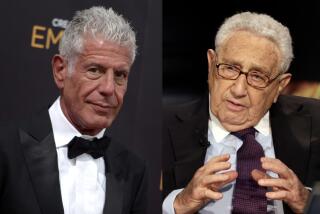Rogue Countries
- Share via
Henry Kissinger, in his article “Joining Germanys” (Opinion, April 15), states that “a system of collective security has historically proved useless against the biggest threat to peace--a major rogue country.” He then asks, “How could such a system avoid all the frustrations of the United Nations and the League of Nations?”
Kissinger overlooks the reasons for the frustrations of the United Nations. Former Secretary General U Thant once said: “The ultimate crisis before the United Nations is the crisis of authority, and nations are reluctant to give to the United Nations the authority it needs.”
Possible first steps to restructure the U.N. with the authority it needs would be (1) to create an international verification system (as proposed by the Six Nation Initiative) to verify compliance with arms- reduction agreements; (2) to establish a U.N. peacekeeping reserve of earmarked national contingents (as proposed by President Carter), and (3) to create an international criminal court (as proposed by 14 Caribbean nations) to try individuals accused of transnational drug trafficking.
Mikhail Gorbachev, to his credit, appears to be open to or supportive of all three initiatives. Kissinger, instead of bewailing the “frustrations” of the U.N., should urge President Bush to support these steps.
Historically, balance of power politics as advocated by Kissinger has never achieved a lasting peace. Nor can a weak U.N. Only a world federation, able to enforce world laws on individuals as well as major rogue countries, can do that.
WALTER HOFFMANN
Executive Director
World Federalist Assn.
Washington, D.C.
More to Read
Sign up for Essential California
The most important California stories and recommendations in your inbox every morning.
You may occasionally receive promotional content from the Los Angeles Times.













